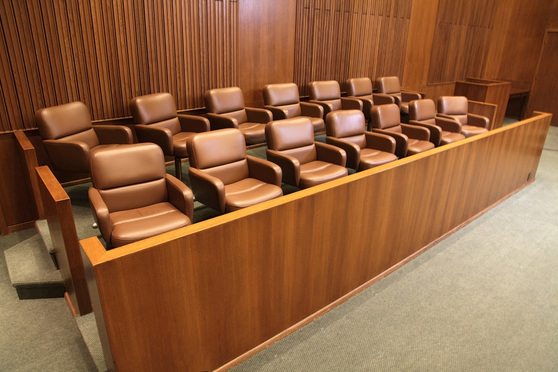Pa. Supreme Court's Advice on Preserving Jury Charge Challenges: Speak Up
The Pennsylvania Supreme Court has clarified the proper procedure for preserving a jury instruction challenge for appeal, while also noting that there's one sure-fire way to waive such a challenge: failing to object at trial when given the chance.
August 29, 2018 at 08:10 PM
6 minute read
 Photo: Jason Doiy
Photo: Jason Doiy
The Pennsylvania Supreme Court has clarified the proper procedure for preserving a jury instruction challenge for appeal, while also noting that there's one sure-fire way to waive such a challenge: failing to object at trial when given the chance.
In Jones v. Ott, the high court ruled 4-3 that plaintiff Helen Jones waived her challenge to the trial judge's failure to charge the jury on negligence per se in her motor vehicle accident case because her attorney explicitly declined to object at the time the charge was made, despite the judge's explicit invitation to do so.
After giving the jury charge, which did not include instructions on negligence per se, a Cambria County trial judge asked attorneys for both sides whether they had anything they wanted to put on the record with regard to the charge. Jones' attorney, according to the majority opinion penned by Justice David Wecht, responded, “'I have no issues with the charge, Your Honor.'”
While Jones argued on appeal that she had previously preserved the issue by filing three proposed points for charge related to negligence per se, Wecht said her attorney's failure to object at trial, when the judge expressly opened the door for such a challenge, constituted a waiver.
“Trial lawyers waive claims, objections, and issues all the time, and do so upon all sorts of rationales,” Wecht said in the court's Aug. 21 majority opinion. “These waivers may occur for countless strategic or tactical reasons, or may be based upon intervening developments in the trial record, or may reflect simple inadvertence or error. Our trial courts must be free to accept such unequivocal statements of counsel as consequential and binding.”
“Thus, even if Jones had preserved her jury-charge issue in the first instance, her affirmative statement on the record that she no longer had any 'issues with the charge' waived any available post-trial claim,” Wecht continued. “When a trial judge directly asks for any objections, counsel must directly state them, explicitly or by reference to prior recorded objections, on pain of waiver.”
Wecht was joined on this point by Chief Justice Thomas Saylor and Justices Max Baer and Debra Todd.
Meanwhile, those four justices also agreed that merely filing a proposed point for charge is not enough to preserve a jury charge challenge for appeal. However, not all of those justices agreed with Wecht that Jones should have known that.
According to Wecht, the parties in Jones met with the judge for a charge conference but the meeting was not transcribed. As a result, there was nothing on the record indicating the judge's ruling on Jones' proposed points for charge on negligence per se, save for the fact that no such instruction was given at trial.
“Without an on-the-record ruling upon a proposed point for charge, an appellate court cannot know whether the trial court denied the point for charge, whether counsel withdrew the point for charge, or whether the parties agreed upon a compromise charge,” Wecht said. “Trials are dynamic, and it is not unusual for lawyers to modify or withdraw points for charge that were previously drafted and submitted but that end up at variance with the record developed during the trial.”
“Moreover, parties sometimes compromise as to certain instructions,” Wecht continued. “Consequently, the mere filing of proposed points for charge cannot assure a record sufficient to allow meaningful appellate review. Indeed, today's case exemplifies this problem: the trial court's recollection of the charge conference differs from the recollection of Jones' counsel. A transcript or explicit written ruling upon the contested instructions would obviate the dispute and enable merits review.”
Baer and Todd joined this portion of Wecht's opinion. Saylor, however, wrote in a separate concurrence that, while he agreed with the majority that Jones' failure to object at trial when given the opportunity amounted to a waiver, “I find the present law to be less clear concerning whether submission of proposed points for charge, in a civil case, suffices to preserve subsequent challenges to a jury charge.”
“Accordingly, and while I ultimately agree with the majority's policy-based rationale that something more should be required, I would interpose further requirements on a prospective basis only,” Saylor said.
In footnote 13 to the majority opinion, Wecht acknowledged Saylor's opinion, saying, “four justices agree that, moving forward, in order to preserve a jury-charge challenge under Pa.R.C.P. 227.1 by filing proposed points for charge with the prothonotary, a party must make requested points for charge part of the record pursuant to Pa.R.C.P. 226(a), obtain an explicit trial court ruling upon the challenged instruction, and raise the issue in a post-trial motion.”
Meanwhile, Justice Kevin Dougherty wrote a dissent, joined by Justice Christine Donohue, arguing that Jones' filing of a point for charge “clearly sufficed to make a record and preserve the issue for appellate review.”
“Despite these explicit instructions in the rules and echoed in relevant case law, the majority now imposes brand new burdens on litigants, including requesting transcripts be made at the charging conference, placing formal objections on the record, and/or 'obtain[ing] an explicit trial court ruling upon the challenged instruction' to preserve error which is already preserved by the submission and filing of those points,” Dougherty said. “The majority thus announces a new rule where the specific objection to the charge is not an alternate method of preservation, but the mandatory method of preservation. Counsel's failure to predict this new requirement has resulted in waiver, and is especially egregious here where counsel satisfied the rules' express requirements.”
Justice Sallie Updyke Mundy penned her own dissent, also joined by Donohue, arguing that, under Pennsylvania Rule of Civil Procedure 227.1, all a party must do to preserve a jury instruction challenge is file a point for charge and a post-trial motion, both of which Jones did.
“The trial court is not required to rule on proposed points for charge on the record, nor is an additional on-the-record objection to an omitted charge required,” Mundy said. “Further, if proposed points for charge have been filed prior to trial, a party is not required to make an on the record objection, even if the trial court inquires generally if there are any further objections to the charge given.”
Counsel for the defendants Ron Ott and Eastern Elevator Service and Sales Co., James Marrion of Pietragallo Gordon Alfano Bosick & Raspanti in Pittsburgh, said he thought footnote 13 in the majority opinion provided a “road map” to practitioners on how to preserve a jury instruction challenge from now on.
“I think that going forward … that rule is what must be followed,” he said.
Counsel for Jones, Mark Bennett of Berger and Green in Pittsburgh, declined to comment on the ruling.
(Copies of the 33-page opinion in Jones v. Ott, PICS No. 18-1057, are available at http://at.law.com/PICS.)
This content has been archived. It is available through our partners, LexisNexis® and Bloomberg Law.
To view this content, please continue to their sites.
Not a Lexis Subscriber?
Subscribe Now
Not a Bloomberg Law Subscriber?
Subscribe Now
NOT FOR REPRINT
© 2025 ALM Global, LLC, All Rights Reserved. Request academic re-use from www.copyright.com. All other uses, submit a request to [email protected]. For more information visit Asset & Logo Licensing.
You Might Like
View All


Feasting, Pledging, and Wagering, Philly Attorneys Prepare for Super Bowl
3 minute read
TikTok Opts Not to Take Section 230 Immunity Fight to U.S. Supreme Court
4 minute readTrending Stories
- 1States Accuse Trump of Thwarting Court's Funding Restoration Order
- 2Microsoft Becomes Latest Tech Company to Face Claims of Stealing Marketing Commissions From Influencers
- 3Coral Gables Attorney Busted for Stalking Lawyer
- 4Trump's DOJ Delays Releasing Jan. 6 FBI Agents List Under Consent Order
- 5Securities Report Says That 2024 Settlements Passed a Total of $5.2B
Who Got The Work
J. Brugh Lower of Gibbons has entered an appearance for industrial equipment supplier Devco Corporation in a pending trademark infringement lawsuit. The suit, accusing the defendant of selling knock-off Graco products, was filed Dec. 18 in New Jersey District Court by Rivkin Radler on behalf of Graco Inc. and Graco Minnesota. The case, assigned to U.S. District Judge Zahid N. Quraishi, is 3:24-cv-11294, Graco Inc. et al v. Devco Corporation.
Who Got The Work
Rebecca Maller-Stein and Kent A. Yalowitz of Arnold & Porter Kaye Scholer have entered their appearances for Hanaco Venture Capital and its executives, Lior Prosor and David Frankel, in a pending securities lawsuit. The action, filed on Dec. 24 in New York Southern District Court by Zell, Aron & Co. on behalf of Goldeneye Advisors, accuses the defendants of negligently and fraudulently managing the plaintiff's $1 million investment. The case, assigned to U.S. District Judge Vernon S. Broderick, is 1:24-cv-09918, Goldeneye Advisors, LLC v. Hanaco Venture Capital, Ltd. et al.
Who Got The Work
Attorneys from A&O Shearman has stepped in as defense counsel for Toronto-Dominion Bank and other defendants in a pending securities class action. The suit, filed Dec. 11 in New York Southern District Court by Bleichmar Fonti & Auld, accuses the defendants of concealing the bank's 'pervasive' deficiencies in regards to its compliance with the Bank Secrecy Act and the quality of its anti-money laundering controls. The case, assigned to U.S. District Judge Arun Subramanian, is 1:24-cv-09445, Gonzalez v. The Toronto-Dominion Bank et al.
Who Got The Work
Crown Castle International, a Pennsylvania company providing shared communications infrastructure, has turned to Luke D. Wolf of Gordon Rees Scully Mansukhani to fend off a pending breach-of-contract lawsuit. The court action, filed Nov. 25 in Michigan Eastern District Court by Hooper Hathaway PC on behalf of The Town Residences LLC, accuses Crown Castle of failing to transfer approximately $30,000 in utility payments from T-Mobile in breach of a roof-top lease and assignment agreement. The case, assigned to U.S. District Judge Susan K. Declercq, is 2:24-cv-13131, The Town Residences LLC v. T-Mobile US, Inc. et al.
Who Got The Work
Wilfred P. Coronato and Daniel M. Schwartz of McCarter & English have stepped in as defense counsel to Electrolux Home Products Inc. in a pending product liability lawsuit. The court action, filed Nov. 26 in New York Eastern District Court by Poulos Lopiccolo PC and Nagel Rice LLP on behalf of David Stern, alleges that the defendant's refrigerators’ drawers and shelving repeatedly break and fall apart within months after purchase. The case, assigned to U.S. District Judge Joan M. Azrack, is 2:24-cv-08204, Stern v. Electrolux Home Products, Inc.
Featured Firms
Law Offices of Gary Martin Hays & Associates, P.C.
(470) 294-1674
Law Offices of Mark E. Salomone
(857) 444-6468
Smith & Hassler
(713) 739-1250





